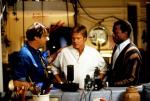As a graduate school requirement, my wife and I were given the option to create a detailed movie guide. After much time and effort, we have achieved the following movie guide for the 1992 movie, Sneakers starring Robert Redford, Sidney Poitier, David Strathairn, Dan Aykroyd, River Phoenix, Mary McDonnell, and Ben Kingsley.
Introduction
The activities in this guide align with the ISTE National Educational Technology Standards (NETS). Focus areas are in computers, information skills, and technology literacy. This study guide is intended for grades 9 – 12, but can be used with other grade levels. These activities can be modified as needed by the teacher based on student aptitude and prior knowledge. Sneakers is rated PG-13 for brief sexual references.
This movie guide is 17 pages long and follows Gavriel Salomon’s Interaction of Media and Cognition and Learning (1979) model called AIME, the Amount of Invested Mental Energy. Teachers should follow the AIME strategy when implementing this study guide to maximize the educational learning potential and understanding for students.
Movie Overview
Sneakers is a light-hearted heist movie with plenty of comedy and romance about computers, hacking, ethics, government espionage, security, secrets, cryptography, deception, betrayal, and little black boxes. The characters model critical thinking skills and creative thinking about technology. On an ethical level, it’s an account of how computers have changed our daily lives both for the better and for the worse.
Despite the fact that its debut was back in 1992, Sneakers has aged surprisingly well. The surveillance techniques and other technical aspects that appear in the movie can still be found today nearly two decades later. One wonders how this movie got so much so right so early.
Plot Synopsis
Marty is the leader of an unlikely team of professional computer hackers that hire themselves out to company executives in order to test their company security systems. This happens to be a real job called Sneaking (as opposed to Hacking, Cracking, or Phreaking) hence the title.
Based in San Francisco, the team is contacted by two NSA agents who want them to steal a top-secret black box containing a homemade computer chip capable of breaking any secret code. The team decides to accept the job and eventually acquires the black box.
Once they discover what the chip is capable of doing, they become entanglement in a deadly game of cat-and-mouse between the National Security Agency and organized crime who also want possession of the chip. They end up handing the chip over to the wrong people and must recover it to clear their good names and prevent themselves from going to jail inside the high-stakes world of government espionage.
Download
- Sneakers Movie Guide (DOC)
Photo Gallery
- Martin ‘Marty’ Bishop
- Donald Crease
- Erwin ‘Whistler’ Emory
- Mother
- Carl Arbegast
- Liz
- Dr. Gunter Janek
- Cosmo
- Dr. Werner Brandes
- December 1969
- Mother’s Workstation
- THE Codebreaker
- The Handoff
- Reunion
- Marty’s Team
- The Man Trap
- 180 IQ
- The Dim Sum Bar Date
- The Motion Sensors
- Sneakers (1992) Movie Poster





















